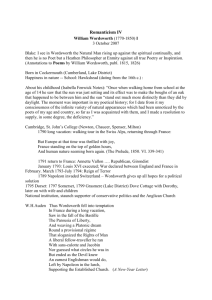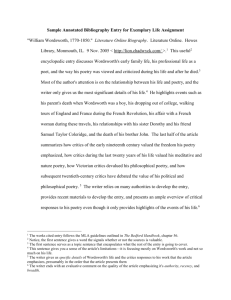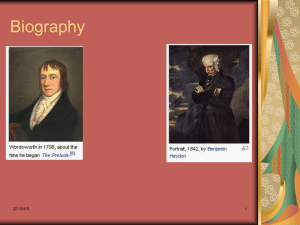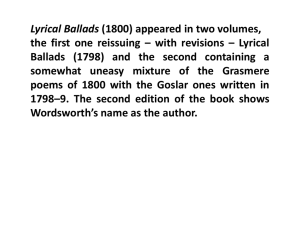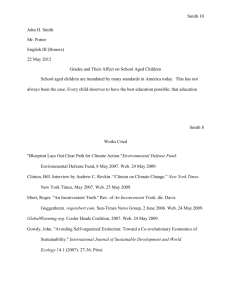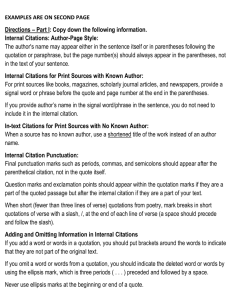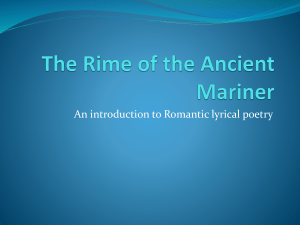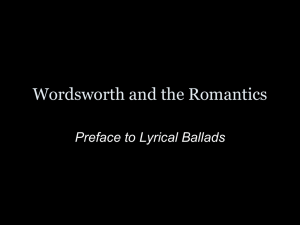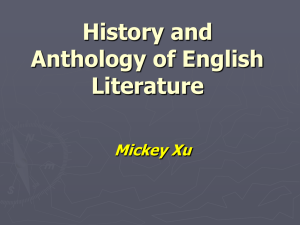Essay 2.doc - English 374 - Professor Buscemi
advertisement
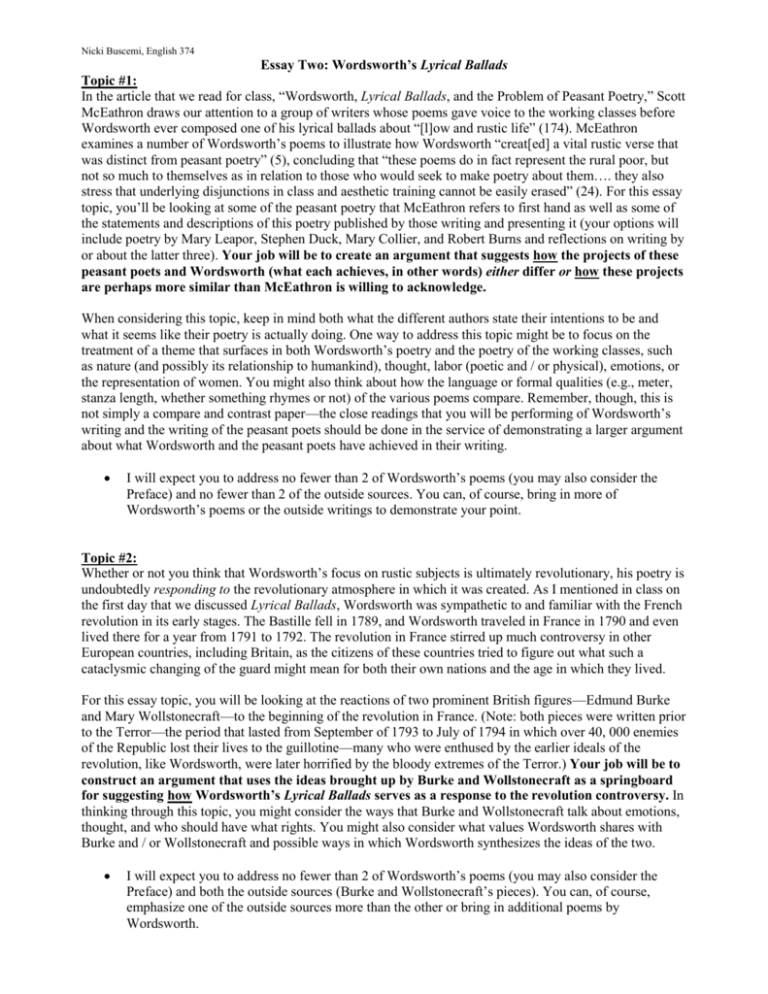
Nicki Buscemi, English 374 Essay Two: Wordsworth’s Lyrical Ballads Topic #1: In the article that we read for class, “Wordsworth, Lyrical Ballads, and the Problem of Peasant Poetry,” Scott McEathron draws our attention to a group of writers whose poems gave voice to the working classes before Wordsworth ever composed one of his lyrical ballads about “[l]ow and rustic life” (174). McEathron examines a number of Wordsworth’s poems to illustrate how Wordsworth “creat[ed] a vital rustic verse that was distinct from peasant poetry” (5), concluding that “these poems do in fact represent the rural poor, but not so much to themselves as in relation to those who would seek to make poetry about them…. they also stress that underlying disjunctions in class and aesthetic training cannot be easily erased” (24). For this essay topic, you’ll be looking at some of the peasant poetry that McEathron refers to first hand as well as some of the statements and descriptions of this poetry published by those writing and presenting it (your options will include poetry by Mary Leapor, Stephen Duck, Mary Collier, and Robert Burns and reflections on writing by or about the latter three). Your job will be to create an argument that suggests how the projects of these peasant poets and Wordsworth (what each achieves, in other words) either differ or how these projects are perhaps more similar than McEathron is willing to acknowledge. When considering this topic, keep in mind both what the different authors state their intentions to be and what it seems like their poetry is actually doing. One way to address this topic might be to focus on the treatment of a theme that surfaces in both Wordsworth’s poetry and the poetry of the working classes, such as nature (and possibly its relationship to humankind), thought, labor (poetic and / or physical), emotions, or the representation of women. You might also think about how the language or formal qualities (e.g., meter, stanza length, whether something rhymes or not) of the various poems compare. Remember, though, this is not simply a compare and contrast paper—the close readings that you will be performing of Wordsworth’s writing and the writing of the peasant poets should be done in the service of demonstrating a larger argument about what Wordsworth and the peasant poets have achieved in their writing. I will expect you to address no fewer than 2 of Wordsworth’s poems (you may also consider the Preface) and no fewer than 2 of the outside sources. You can, of course, bring in more of Wordsworth’s poems or the outside writings to demonstrate your point. Topic #2: Whether or not you think that Wordsworth’s focus on rustic subjects is ultimately revolutionary, his poetry is undoubtedly responding to the revolutionary atmosphere in which it was created. As I mentioned in class on the first day that we discussed Lyrical Ballads, Wordsworth was sympathetic to and familiar with the French revolution in its early stages. The Bastille fell in 1789, and Wordsworth traveled in France in 1790 and even lived there for a year from 1791 to 1792. The revolution in France stirred up much controversy in other European countries, including Britain, as the citizens of these countries tried to figure out what such a cataclysmic changing of the guard might mean for both their own nations and the age in which they lived. For this essay topic, you will be looking at the reactions of two prominent British figures—Edmund Burke and Mary Wollstonecraft—to the beginning of the revolution in France. (Note: both pieces were written prior to the Terror—the period that lasted from September of 1793 to July of 1794 in which over 40, 000 enemies of the Republic lost their lives to the guillotine—many who were enthused by the earlier ideals of the revolution, like Wordsworth, were later horrified by the bloody extremes of the Terror.) Your job will be to construct an argument that uses the ideas brought up by Burke and Wollstonecraft as a springboard for suggesting how Wordsworth’s Lyrical Ballads serves as a response to the revolution controversy. In thinking through this topic, you might consider the ways that Burke and Wollstonecraft talk about emotions, thought, and who should have what rights. You might also consider what values Wordsworth shares with Burke and / or Wollstonecraft and possible ways in which Wordsworth synthesizes the ideas of the two. I will expect you to address no fewer than 2 of Wordsworth’s poems (you may also consider the Preface) and both the outside sources (Burke and Wollstonecraft’s pieces). You can, of course, emphasize one of the outside sources more than the other or bring in additional poems by Wordsworth. ***Please note: you must have both selected a topic and done the outside reading for that topic by Monday, March 29th. We will be discussing these outside sources in class on that Monday. Please make sure to bring any questions that you have about the readings with you to class on that day.*** These outside sources can all be found on our course website: http://engl374-buscemi.wikispaces.umb.edu To successfully complete this essay, you must: Create a strong, thesis-centered argument in response to the topic that you’ve chosen. Provide careful close readings of Wordsworth’s poetry, his Preface, and the outside sources that you’re working with in order to demonstrate your claims. Thoughtfully engage the outside sources that you choose to use. (Please see the individual topics for the number and types of sources required for each topic.) Smoothly and effectively integrate quotes and paraphrases from Wordsworth and the outside readings and cite them properly in MLA style. Due Dates and Grading You must choose the topic you’ll be working on and do the outside reading by Monday, March 29th. (See note above.) Final Draft Due: Wednesday, April 7th This essay is worth 30% of your grade. (5-7 pages)
